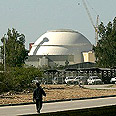
Bushehr nuclear reactor
Photo: AFP
Gulf states also want to go nuclear
Representatives from Cooperation Council for the Arab States of the Gulf aspire to join forces, develop nuclear capability for peaceful purposes out of concern about Iranian nuclear program. Council's six member states call Lebanese nation to unite, bring assassination perpetrators to justice
Six member states of the Cooperation Council for the Arab States of the Gulf announced Sunday that they want to obtain the capability to produce nuclear energy "for peaceful purposes."
Representatives of the six states announced that they were instructed to examine the possibility of initiating a joint nuclear energy project. Such was written in an announcement sealing a two-day gathering on the issue in Riyadh. Representatives from Saudi Arabia, Qatar, Bahrain, Oman, Kuwait, and the United Arab Emirates.
Israel Concerned
Deputy Chief of Staff says nuclear Iran will pose threat to Israel and Europe; talks with international community over nuclear activities aimed at stalling for time, while Hizbullah prepares for second war
Secretary General of the council Abdul Rahman al-Attiya said, "It is the right of the states in the region to obtain nuclear technology for peaceful purposes."
During the council meeting, concern was raised about the nuclear aspirations of Iran. In addition, the countries announced that they will advance the plan for developing an economic union between them on the example of the European Union.
The closing statements of the gathering come as no surprise since analysts have recently been projecting that Saudi Arabia and Egypt will ask to develop nuclear capability after the Iranians in order not to be left in the dust behind the rising power in the Middle East.
A few months ago, Egyptian President Hosni Mubarak announced that his country plans to establish a nuclear power plant and to obtain nuclear power for peaceful purposes in order to solve the energy crisis in his country "for the coming generations." After this announcement, Saudi Arabia was also expected to declare a similar step.
The Gulf states are worried by a strengthening Iran and by the implications for the Shi'ite communities among them.
Worried by events in Lebanon
State representatives in the council meeting expressed concern about the intensifying tension in Lebanon and a series of political assassinations in the country.
At the end of the meeting, they called the Lebanese to unite, to rise about the political controversies, and to return to the negotiation table: "The continuation of these terrorist acts (the assassinations) are likely to intensify the political tension and to give opportunities to those who wish to harm Lebanon."
In addition, council members expressed their hope that those responsible for the assassinations in Lebanon will be revealed and will be brought to justice. They called all the sides to cooperate on this issue. The six states even committed themselves to continue aiding Lebanon's rehabilitation in the political and economic realms.















